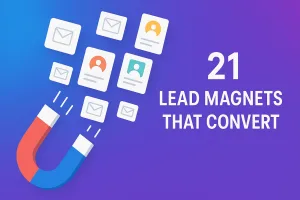Lead generation is the process of attracting and converting potential customers, known as leads, into individuals or businesses interested in your company’s products or services. It’s a crucial aspect of modern marketing and sales strategies, designed to fill the sales pipeline with qualified prospects.
1. Definition of Lead Generation
Lead generation involves identifying and cultivating potential customers for a business’s products or services. A lead is a person or organization that has shown interest in what you’re offering, typically by providing their contact information or engaging with your content.
2. Importance of Lead Generation for Businesses
Lead generation is vital for several reasons:
- It helps businesses grow their customer base: Effective lead generation strategies attract more potential customers, increasing the chances of conversions.
- It increases brand awareness and market presence: By reaching out to a broader audience, businesses can enhance their visibility and establish a strong market presence.
- It provides valuable data for targeted marketing efforts: Lead generation activities gather crucial information about potential customers, enabling more precise and effective marketing campaigns.
- It supports sales teams by providing a steady stream of potential customers: A consistent influx of leads ensures that sales teams have a pool of prospects to work with, improving their efficiency and productivity.
- It can improve return on investment (ROI) for marketing activities: By focusing on high-quality leads, businesses can achieve better ROI from their marketing efforts.
3. Key Components of the Lead Generation Process
The lead generation process typically involves:
a) Attracting visitors through various marketing channels: Utilizing different platforms such as social media, search engines, and content marketing to draw in potential leads.
b) Engaging visitors with valuable content or offers: Providing useful and relevant information to keep visitors interested and engaged.
c) Capturing lead information through forms or other means: Collecting contact details and other relevant information through signup forms, landing pages, and other methods.
d) Nurturing leads with relevant follow-up communication: Building relationships with leads through email marketing, personalized messages, and other follow-up strategies.
e) Qualifying leads to determine their potential value: Assessing the quality and readiness of leads to ensure they meet the criteria for potential customers.
f) Handing off qualified leads to the sales team: Passing on the most promising leads to the sales team for further engagement and conversion.
4. Common Lead Generation Strategies
Businesses use various strategies to generate leads, including:
- Content marketing (blogs, whitepapers, ebooks): Creating valuable content that attracts and educates potential leads.
- Search engine optimization (SEO): Optimizing website content to rank higher in search engine results and attract organic traffic.
- Pay-per-click (PPC) advertising: Using paid ads to drive traffic to landing pages and capture leads.
- Social media marketing: Leveraging social media platforms to engage with potential leads and promote content.
- Email marketing: Sending targeted email campaigns to nurture leads and drive conversions.
- Webinars and online events: Hosting virtual events to engage and educate potential leads.
- Referral programs: Encouraging existing customers to refer new leads.
- Trade shows and networking events: Participating in industry events to connect with potential leads in person.
- Gamification: Using gamified lead generation apps like VideoGamesuite
5. Measuring Lead Gen Success
Key metrics for evaluating lead gen efforts include:
- Number of leads generated: Tracking the total number of leads captured through various strategies.
- Lead quality and conversion rates: Assessing the quality of leads and their likelihood to convert into customers.
- Cost per lead: Calculating the cost of acquiring each lead to determine the efficiency of lead generation strategies.
- Return on investment (ROI): Measuring the overall financial return from lead generation activities.
- Customer lifetime value (CLV): Estimating the long-term value of acquired customers to the business.
6. Challenges and Best Practices
Common challenges in lead generation include:
- Standing out in a crowded marketplace: Differentiating your business from competitors to attract attention.
- Generating high-quality leads: Focusing on leads that are more likely to convert into paying customers.
- Aligning marketing and sales efforts: Ensuring that both teams work together towards common goals.
- Keeping up with changing technology and consumer behavior: Adapting strategies to stay relevant in a dynamic market.
Best practices for effective lead generation:
- Clearly define your target audience: Understand who your ideal customers are and tailor your strategies to attract them.
- Create valuable, relevant content: Provide content that addresses the needs and interests of your potential leads.
- Use a multi-channel approach: Diversify your lead generation efforts across various platforms and channels.
- Implement lead scoring and nurturing systems: Use tools and techniques to prioritize and nurture leads effectively.
- Continuously test and optimize your strategies: Regularly evaluate and refine your lead generation tactics for better results.
- Ensure compliance with data protection regulations: Follow legal guidelines to protect the privacy and data of your leads.
Conclusion
Lead generation is a critical process for businesses looking to grow and thrive in today’s competitive market. By understanding and implementing effective lead generation strategies, companies can attract potential customers, nurture relationships, and ultimately drive sales growth.







